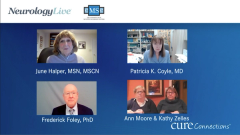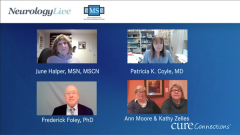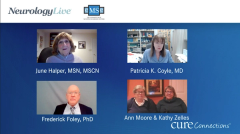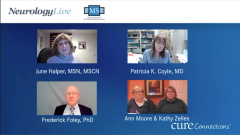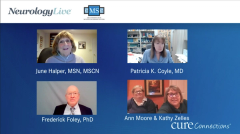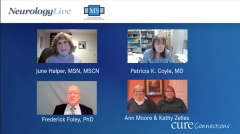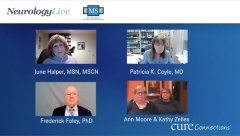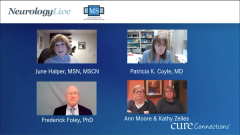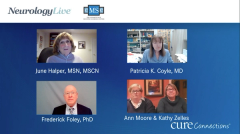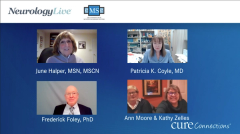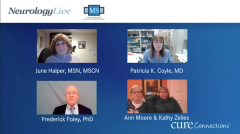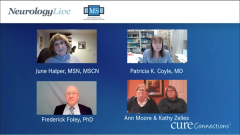
Patient’s Journey: Diagnosis of Multiple Sclerosis

Episodes in this series

Ann Moore, a patient with multiple sclerosis, shares the story of her diagnosis. Kathy Zelles adds her perspective as a care partner.
June Halper, MSN, MSCN: I know your journey started a long time ago with MS [multiple sclerosis], Ann, when your mom was alive. I remember I got to meet her, but she was much more advanced in her disease, and she was much older. Were you diagnosed during her lifetime or was it after?
Ann Moore: No, I was diagnosed eight months after she had passed away. I was diagnosed in June of 1989, so needless to say I was a little freaked out because I saw how progressed my mother was and how limited she was in what she could do. I didn’t know at 15, which is the age that I was; I was told the day my father died that she had MS. She had had it for eight years, but she never told me because I was the youngest of the three. My father and my two siblings knew, but I was not told any of this. I saw things, I didn’t know what was going on. I saw things and then I’m diagnosed, and I said, “Oh my goodness, I’m going to end up just like my mother,” and that scared me.
June Halper, MSN, MSCN: Did you go to a primary care physician or your regular doctor first?
Ann Moore: I did go to my primary care physician because, I was sitting one day getting my hair permed on a Saturday, and I had my hands crossed. I came home, and I told Kathy I had tingling in my middle finger, my ring finger, and my index finger on my left hand. Being the occupational therapist that she is, she said, “Oh, it must be carpal tunnel” syndrome. I said, “Yes, that sounds reasonable.” Well, as the weeks went on, it progressed, and I’m left hand dominant. It got to the point where the tingling went to numbness, and it worked its way up my arm, and by midafternoon, I felt like I had a tourniquet on me between my elbow and my shoulder, and I was unable to even hold a pen.
I went to my primary care physician, and because a few weeks before I had a sinus infection and bronchitis, I was thinking maybe there’s a swollen lymph node under my armpit. He sent me to a neurologist. I went to a neurologist, I told him my family history, but he was not looking for multiple sclerosis. I forget even what he was looking for. He sent me for an MRI [magnetic resonance imaging], and then called me in my office, and I figured, oh, anybody worth their weight in gold will have me come in to the office and discuss the MRI with me. No. On the rainiest day possible, he called me and said to me, “Miss Moore, I think you have multiple sclerosis, and I’d like you to come in for a lumbar puncture.” I said, “Oh, no, no, no, I’m not having that done. My mother had it done and said it was the worst pain she’s ever experienced.” And he said with this arrogant sneer and laugh, “But I didn’t do your mother’s lumbar puncture.” I said, “You know what, you’re not doing mine either,” and I hung up the phone. That’s when I called you, June, and you said, “Annie, Annie, I’m going to clear the doctor’s schedule, and you’re going to come over tomorrow, and we’re going to take care of this.” And that’s what happened.
June Halper, MSN, MSCN: I wish you hadn’t joined the club, but let me tell you it’s been….
Ann Moore: Yeah, right? If I’ve got to be in a club with anybody, you’re a good person to be in a club with.
June Halper, MSN, MSCN: Thank you. Kathy, how has this all impacted you and your relationship? I know you’re a professional, you’re an OT [occupational therapist] and probably have a lot of suggestions to make in the management of Ann’s disease.
Kathy Zelles: That’s what happened. I jump from my professional self to my personal self. We’re both pretty easy going, for the most part. We kind of roll with the punches, so we’ve been lucky in that sense. We haven’t had a lot of crises related to the MS. It’s like a wax and wane. For the most part, we’ve gone on with our lives the best that we could and used a walker here and a wheelchair there for when things get tough. When it’s not, we go on like it’s any other day.
June Halper, MSN, MSCN: How’s the journey been on you personally, especially because you’re a rehab professional? It must be frustrating sometimes.
Kathy Zelles: You know what it was like initially. Who was the patient? Was I the patient, or was she the patient?
Ann Moore: Right.
Kathy Zelles: Because my only reference at that point, I was a brand-new therapist, and the only people I had seen were in the hospital, were very debilitated and that’s all I could see. But the more we explored, once I got over the initial shock of, “Holy moly, I have to change the bathroom, and we’re going to have to open the doors,” the rehab head in me, we settled down and we managed. Since the beginning, once I got over the first shock, I think we’ve been OK. We’re lucky.
Ann Moore: There were bumps in the road, but that’s where Dr. Foley comes in.
Kathy Zelles: Right.
June Halper, MSN, MSCN: We’ll get to him in a little bit.
Ann Moore: Absolutely.
June Halper, MSN, MSCN: Your journey has been interesting, that’s for sure.
Ann Moore: It really has been because eight months after my mother died, I was diagnosed. I’m thinking, “Oh my God.” Everybody I knew as a young adult in Glen Rock, New Jersey, who had MS, their spouse left them. I said, “Oh my God, Kathy is going to leave me, and I’m going to end up in a wheelchair,” and so I had a pretty hard time for a while in getting through that stage.
June Halper, MSN, MSCN: I want to thank you all for watching and joining us at this NeurologyLive® Cure Connections®. If you enjoyed this program, please subscribe to the e-newsletter to receive upcoming information about other programs. I’d like to thank you all for the time and for this wonderful opportunity, and hope to see you all again.
Newsletter
Keep your finger on the pulse of neurology—subscribe to NeurologyLive for expert interviews, new data, and breakthrough treatment updates.

